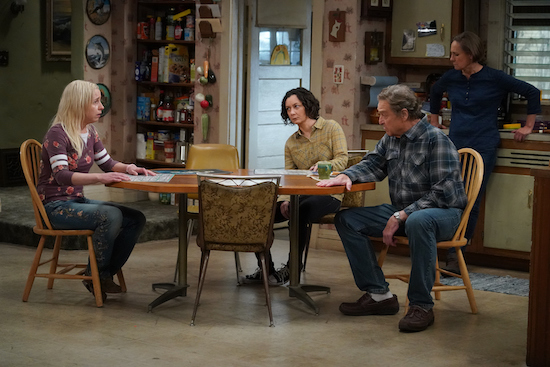THE CONNERS’ Lecy Goranson and Bruce Rasmussen on Becky’s Relapse: Recovery ‘is Not a Straight Line’
April 14, 2021 by Marisa Roffman

Credit: ABC
THE CONNERS’ Becky (Lecy Goranson) thought she could have a night off, complete with a drink…but it soon became apparent why she couldn’t.
After her daughter got sick—and made it clear she was more comfortable with her father—Becky spiraled, quickly getting drunk…even when Beverly Rose was back with her.
Though initially Becky denied it, her family confronted her about her drinking, eventually conceding she’d go to rehab to try and begin the road to recovery.
Here, Goranson and executive producer Bruce Rasmussen dive deep into Becky’s breakdown, and preview the tough road ahead…
What led to the decision to have Becky relapse?
Bruce Rasmussen: Lecy actually had the idea of the story with Mikey; that whole [thing] was her idea about meeting somebody from your past that knew you as a success and having to face the fact that you haven’t lived up to that future that you thought you had. At the end of last year, we talked about what could happen this year. We got some flack last year from her stopping drinking, and people said, “Well, it’s just so easy. It’s just too easy.” We also knew at a certain point that we would probably go down and revisit this area. We talked to Lecy about it; it’s very collaborative with her. She’s got a great mind for story and character. She’s lived this character for 30 years, so she knows better than we do.
Lecy Goranson: I felt like that [she was] going to rock bottom. It was interesting, because both the writers and I had an intuition, I think because of COVID, that we saw a lot of people kind of losing it. I know I have lost it. Most of my girlfriends have lost it, because it’s just a lot; it’s a lot to hold, everything that this past year has involved.
I thought it’d be interesting if part of what drew Becky on a downward spiral was actually something very positive. And what was positive was revisiting someone who really loves her. And supports her. But the thing is is that she just couldn’t [deal with it]. It’s like her shame was too much. And also kind of like the Cinderella myth: here she is playing another person at this beautiful place, playing someone who’s successful. Playing someone who made it big, who’s in a work dress, and her hair is done, and whatever. Because I feel like that’s who she could have been. And in some ways that’s who she is.
And one thing that was really powerful about that scene, when you hear Mikey saying, “You were this straight-A student; you were my main competition,” is a lot of people who watch THE CONNERS, and didn’t watch ROSEANNE, they don’t know that about Becky. They don’t know that she was a straight-A student. They don’t know that she was an overachiever, and that’s really who she was. And who she is, at base: someone who’s really smart. And like many people, for whatever reason—financial or whatever—didn’t have the opportunities that other people did have.
What was the discussion in the writers’ room about how long you wanted Becky to be actively in a relapse before the family caught on?
Rasmussen: From our point of view, we knew that it was going to be towards the end of the season. And so we knew that it was going to [start in] 14 where she sees Mikey and then we had till 20 to sort of—not wrap it up, because you can never wrap up alcoholism, but to get the arc of her journey from the first drink ’til where she winds up in 20. So we knew we had that many episodes to do it.
It’s hard, because you want to do it realistically, but rehab is 30 days. So we had to sort of crunch things a little bit more than we would have liked to, but the way it came out, I think, was great. And Lecy is an amazing actress. The heartbreak and her going through all that, because she is incredibly smart and incredibly tough..it’s not saying much, but she’s the most positive Connor there is. So her having to go through this, you’re really pulling for her.
Lecy, we saw Becky going through the wringer as she spiraled, some of which was essentially solo—and you were filming that sans a studio audience to feed off of. How did that compare to your normal process with digging into the tougher scenes on this show pre-pandemic?
Goranson: That’s a good point, because it is true that the audience does bring that kind of level of intensity and brings us dramatic energy. But, honestly, if the writing is solid and strong, I don’t really feel so much about what I bring. I feel it’s laid out for me, the writing’s there, and I’m working with incredible actors.
When Jackie is yelling, she’s the one that confronts me, and it’s very intense and. And, also, I know where Becky is in terms of the arc. It’s funny, because it sounds very actor-y to talk about the arc, but it’s also very important, because you want to really land each thing emotionally so it makes sense and it tracks. And I feel like that was a conversation that I would have with the writers in terms of how to specify those moments.
But it really was all there. When we rehearse, but when it’s go time and the cameras are there, even without the audience, you still kind of feel that heightened level of performance. And that makes it different when we’re shooting than when we’re rehearsing; rehearsals are about tracking everything, and then performing it’s go time, and in a way you feel more present. But, fortunately…I’ve done jobs before as an actor, where I have to put on [emotion]. It’s an adage in New York when you’re doing LAW & ORDER stuff, it’s like you’ve got to bring on the tears. But the best thing about it is when it’s already kind of set up for you, and it just feels natural, but not comfortable, to be in that emotional moment.
Becky’s daughter was a key factor in her eventually agreeing to go to rehab. What was the line of how involved she could be before it crossed a major line with viewers?
Rasmussen: It was basically what we ended up doing, which is the idea that the baby has a fever, and she’s not there for the baby during that period of time. Because we needed something that was enough to break through her denial, but not so bad that you couldn’t forgive her; so that’s why we did it the way we did it. Which is such a great scene, because these Lecy’s playing this horror, when Jackie says the baby fell between the bed and [wall]. And then Laurie [Metcalf] to turn around [and reveal she was lying], it was a huge laugh from us. With those two actresses, it’s just amazing to watch.
During the week we’ll write something [for] the table [read] that will change during the week based on performance and what she thinks and what we think. Like she said, this is the best cast on television, by far, and we’re so lucky to be able to write for them.
Goranson: It was interesting to try to feel…I think there is the adage rock bottom and what that means, but I think the fact that she’s in this position already, that many, many women are—I would say all mothers—do I tend to my child and forego material or financial stability, or do I work to [try and improve things]? It’s such a catch-22 And there’s been countless articles during COVID about this with mothers, in terms of being there for the child who’s at home. Normally, you rely on teachers as almost other mothers and fathers, but when it’s all on the mother, it’s just overwhelming. So I think the fact that Beverly Rose was involved it really made sense, because that really is Becky’s primary [focus]; the thing that she deems the most important in her life is her daughter.
Rasmussen: Absolutely, yeah.
How much are we seeing her in rehab?
Rasmussen: 17, 18, 19, and 20 are about her in rehab.
How does going there impact her mindset?
Goranson: What I’ve been saying is, rightly, that Becky is very stubborn. She’s a very stubborn person and she’s not one to give in to something easily. She’s not one to do that so. And also she has a lot of defenses up, so let’s just say that her journey into recovery is not an easy one, and not one that she goes willingly into.
Rasmussen: Yes, it’s not a straight line.
THE CONNERS, Wednesdays, 9/8c, ABC
RELATED:
- THE CONNERS: Lecy Goranson and Bruce Rasmussen on Becky’s Sobriety Slip-Up
- THE CONNERS: Candice Bergen to Guest Star
- THE CONNERS: ‘Halloween and The Election vs. The Pandemic’ Photos
- THE CONNERS: What You Need to Know About the Season Premiere
- THE CONNERS Season 3 Key Art
- ABC Sets Fall 2020 Premiere Dates
- ABC Sets 2020-2021 Schedule
Follow @GiveMeMyRemote and @marisaroffman on Twitter for the latest TV news. Connect with other TV fans on GIVE ME MY REMOTE’s official Facebook page.
And be the first to see our exclusive videos by subscribing to our YouTube channel.
As an Amazon Associate we earn from qualifying purchases made through links/ads placed on the site.
Related Posts
Filed under The Conners
Comments Off on THE CONNERS’ Lecy Goranson and Bruce Rasmussen on Becky’s Relapse: Recovery ‘is Not a Straight Line’



Comments